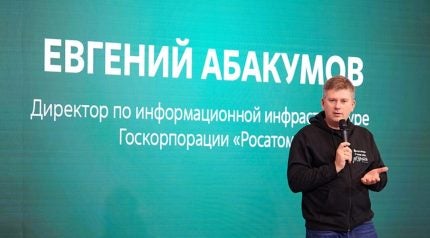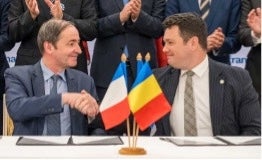
The IT Core conference, held at the Mayak Academy site in Nizhny Novgorod, was organised by the Rosatom Corporate Academy (KAR – Korporativnaya Akademiya Rosatoma) with the support of leading Russian universities. The event was attended by representatives of Rosatom, students, young IT (information technology) specialists and representatives of the leading digital companies.
The conference was dedicated to finding solutions to key issues related to the implementation of advanced technologies. The event provided young people with the opportunity to learn more about the Rosatom’s IT brand, work on creating digital solutions for the nuclear industry, get acquainted with the largest employers in Russia, and also offer their own ideas and projects.
Rosatom’s Director of Digitalisation, Ekaterina Solntseva, addressing the opening session, spoke about Rosatom’s large-scale tasks and projects in the field of future technologies, which provide young specialists with a wide range of opportunities for professional implementation.
“Rosatom is actively working in several areas of digitalisation, including creating technologies for the future,” she said. “Why are we looking to the future? We are building NPPs with a life cycle of 100 years!… According to the results of the implementation of the quantum calculation roadmap, coordinated by Rosatom, Russia is already in the top three leading countries with existing quantum computers on four main platforms.”
Rosatom’s Director for Information Infrastructure, Evgeny Abakumov described the skills and knowledge a modern IT specialist should have and emphasised Rosatom’s role in achieving technological sovereignty in Russia. “Today we all face a big task to achieve a sustainable future that would take into account issues of technological independence, ethics, as well as the trends that exist in the world now,” he said. “We are actively developing critical information infrastructure, implementing projects in electromobility, and in the field of artificial intelligence.”
He added: “We not only develop and test technologies, but also offer energy supply and computing power through a network of disaster-proof data centres. Our projects are aimed at creating a sustainable and technological future, but for this it is necessary to train specialists who can create and support innovative solutions. The combination of technical skills and analytical thinking is becoming a decisive factor for successful work in a rapidly changing technological landscape.”
Rosatom’s Deputy General Director for Personnel, Tatyana Terentyeva noted that, to solve all IT problems by 2030, it is necessary to attract more than 33,000 digital specialists to the industry, about 5,000 a year, a third of whom are graduates.
“You can become part of Rosatom today. The career of digital specialists in a state corporation begins during training,” she noted. “Our IT internships are available to everyone from all over the country – 1,400 people have already taken part in them. Internships allow you to develop unique competencies necessary to work in the industry and keep abreast of Rosatom’s technological agenda. After two years of working with us, you can become team leads, manage teams and projects.”
During a panel discussion entitled The future is already here: the challenges of IT specialists in the nuclear industry, representatives of domestic development companies discussed trends and challenges in the field of IT, issues of ensuring information security, and training qualified personnel to create advanced technological solutions. Evgeny Abakumov said that one of the most important issues today is the implementation of a life cycle management project in complex industrial facilities: from conception to decommissioning. In addition, he noted the need to create a unified ecosystem of platform solutions.
During the IT Core business programme, expert meetings were held with specialists from Rosatom enterprises, who shared with students, interns and university representatives the challenges facing the nuclear industry. The discussed digital project management, the possibilities of using artificial intelligence, process automation, import substitution, prospects development of digital technologies.
The conference participants heard from Alexey Fedorov, Director of the Institute of Physics & Quantum Engineering at the National University of Science & Technology (MISiS) – formerly the Moscow Institute of Steel & Alloys (MISiS – Moskovskii Institut Stali i Splavov). Fedorov spoke about the development of quantum technologies, reviewed the principles of quantum mechanics and their practical application in various industries. Participants learned about concepts and platforms for quantum computing, quantum sensors and quantum cryptography, challenges in information security, and the challenges facing scientists in this rapidly developing field.
The culmination of the event was the summing up of the results of the competition for the best digital solution. Young specialists presented their projects for evaluation by an expert jury. The winners of the competition will be able to undergo internships at leading companies in the nuclear industry, as well as receive mentoring support from experienced mentors.






